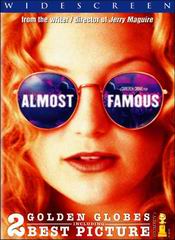Almost Famous
The heart of rock and roll is still beating in writer-director Cameron Crowe’s affectionate, knowing nostalgic nod to his teenage years as a writer for Rolling Stone Magazine.
Anyone who was old enough and conscious to appreciate the early 1970s will totally fall in love with Crowe’s glorious Valentine to rock and roll. This film couldn’t have come from someone who wasn’t there. His observations are so passionate you feel like you’ve been transported back to 1973.

Crowe’s “Almost Famous” is largely autobiographical, celebrating the days when he duped Rolling Stone Magazine into sending him on the road with the Allman Brothers, completely unaware that they were dealing with a savvy fifteen year old kid.
Once on staff at Rolling Stone, Crowe used his boyish good looks to pull off yet another charade. He went undercover back to high school to get a pulse on the youth of America. His experiences became “Fast Times at Ridgemont High.” Crowe’s life is much more interesting than most movies.
“Almost Famous” emerges as one of the best films of the year. Hell, it’s one of the best films of the last twenty years. It’s voice is so honest you forget you’re watching a movie. Instead, you’re hanging out with some really cool people in 1973. Crowe pegs the time with such accuracy the illusion becomes complete.
Cool is not something William Miller (Patrick Fugit) wants to be. As an un-cool teenager growing up in San Diego with his free spirited sister and restrictive mother, William passes his time writing about his favorite bands for his high school paper and a local underground rag. When William impresses his mentor and Creem Magazine editor Lester Bangs (Philip Seymour Hoffman), he finds himself on the road to personal salvation.
It’s not long before Rolling Stone comes calling, and sends him on tour with an up and coming band called Stillwater. Against his mother’s wishes, William agrees to go on the road with the band. Greeted at first as “the enemy,” William’s youthful exuberance eventually begins to rub off on the members of the bands and their various hangers-on. Before the tour is done, William will wind up with a lifetime of experience.
Crowe’s film is much more than a road trip. It’s about people who make a living on the road. The film is character driven, and contains some of the most honest, refreshing dialogue I have heard in a film in a very long time. Characters say and do things that feel real.
The heart of the film is young Patrick Fugit, making his debut as William. Crowe couldn’t have picked a better alter ego. Fugit is marvelous as the eager but essentially naive William. We see the film through his eyes, and there’s an innocence there that makes his awakening even more believable. Fugit hits every mark with undying passion and conviction.
Billy Crudup, one of the best actors working today, shines as Stillwater leader Russell Hammond. A virtual chameleon in every role he plays, Crudup comfortably slips into the threads of Hammond, a man whose condescending attitude towards those around him makes him an easy target. Not only does Crudup look the part, he actually gets under the skin of the character and makes him flesh and blood.
As Penny Lane, the “Band-Aid” who leads a contingency of female fans across the country and abroad, Kate Hudson is absolutely stunning. This is a great performance, filled with insight and emotional fireworks. Hudson has such soulful eyes, and uses them to great advantage. When she learns from William that she has been traded to another band for $50 and a case of beer, her interior dialogue is so devastating you want to reach up on the screen and comfort her.
All of the actors bring that level of conviction to their performances. Jason Lee is excellent as Stillwater lead singer Jeff Bebe, whose love-hate relationship with Hammond provides the film with an electric undercurrent. Frances McDormand enriches the film with her dynamic performance of an over-protective mother who finally realizes that in order to hold on to her children she has to let go.
Philip Seymour Hoffman turns Lester Bangs into a rock and roll guru and seems to have fun in the process, while Zooey Deschanel evokes lots of empathy in her role as William’s older sister and his reason for getting into rock and roll. Deschanel is only on screen for a few moments, but leaves a vivid memory.
As I walked out of “Almost Famous,” I kept thinking to myself how much better Hollywood would be off if they would only let Cameron Crowe make movies. His four screenplays, starting with “Fast Times at Ridgemont High” to “Jerry Maguire,” display unique talent for capturing the way people talk and interact. “Almost Famous” is his best film to date.
Crowe skillfully crafts the movie, paying close attention to every detail. There isn’t one misstep in the film. From John Toll’s perfectly framed cinematography to the authentic musical score by Crowe’s wife, former Heart singer Nancy Wilson, “Almost Famous” is definitive filmmaking.
I fell in love with this film. It spoke to me on so many levels, and then stayed with me long after the final flicker of the projector. It got under my skin and reminded me of a time in my life that was a little more innocent and free. If the ultimate goal of a film is to transport us to another time or place, “Almost Famous” scores a touchdown.
ALMOST FAMOUS
Billy Crudup, Frances McDormand, Kate Hudson, Jason Lee, Patrick Fugit, Zooey Deschanel, Fairuza Balk in film directed by Cameron Crowe. Rated R. 117 Minutes.
LARSEN RATING: $8
